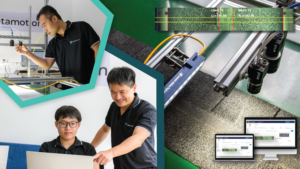In an era where precision and efficiency are vital, scalable quality control (QC) has become more essential than ever. As industries evolve, expectations for product quality and reliability also rise. Many sectors can’t afford to neglect robust QC systems that scale with demand. This article explores five key industries that stand to gain immensely from implementing scalable quality control solutions, especially those powered by AI technology.
1. Manufacturing
Overview
Manufacturing is the backbone of industrial economies, driving innovation and productivity across various sectors. As production rates rise, maintaining high-quality standards becomes non-negotiable. Without effective QC methods, manufacturers risk inefficiencies, increased costs, and compromised products.
Why Scalable QC Matters
In a rapidly changing market, scalable quality control is imperative. This adaptability allows businesses to ramp up production in response to demand changes swiftly. An effective QC framework helps minimize errors and waste, ultimately saving money and improving the bottom line.
AI Defect Detection in Manufacturing
Introducing AI into quality control is a game changer. Smart algorithms streamline inspection processes, spotting defects that might go unnoticed manually. Reducing human error enhances production line efficiency. Implementing AI for defect detection ensures products meet high-quality standards before hitting the market, fostering consumer confidence.
2. Electronics
Overview
Electronics continually push product complexity to new heights. From smartphones to smart home devices, each product must meet exacting standards of precision and functionality. The industry faces the task of maintaining consistent quality across the board amid rapid tech advancements.
Challenges Facing the Industry
Manufacturers face challenges, notably small tolerances, where minor defects can result in failures. As production volumes rise, consistent quality is critical. A single flaw can damage a brand’s reputation, leading to costly recalls or repairs.
How Scalable QC Helps
Scalable quality control offers a solution here. Automated inspection tools handle high-speed production while ensuring every item meets stringent checks. By incorporating AI-driven solutions, manufacturers reduce human error and improve accuracy, identifying anomalies in real-time for immediate corrections. This efficiency ensures every product is built to last, keeping companies competitive in a high-stakes industry.
3. Pharmaceuticals
Overview
High-quality standards are crucial in the pharmaceutical industry. Regulatory bodies enforce stringent safety and efficacy requirements. Defects in medications or vaccines can have severe consequences.
The Need for Scalability
With rising global demand for medications and vaccines, companies must scale production while maintaining quality. Flexibility in production, influenced by public health needs and market demands, is crucial. Scalable QC systems ensure consistent quality, regardless of production volume.
Implementing Scalable QC
AI technologies enhance QC processes significantly. Automated inspections on production lines quickly identify defects and inconsistencies, ensuring regulatory compliance through continuous monitoring and reporting. Reliable QC strengthens public trust in pharmaceutical products, allowing the industry to meet growing demands while prioritizing quality and safety.
4. Food and Beverage
Overview
Consumer safety is paramount in the food and beverage industry. From perishable items to packaged goods, maintaining quality and hygiene isn’t just a preference—it’s a necessity. Tailored quality control methods are essential to ensure products are safe to consume.
Why Scalable QC is Crucial
Rising production demands increase manufacturing complexities. With shifting consumer preferences and fluctuating supply chains, the pressure for safe, high-quality products continues to grow. Real-time monitoring becomes critical. Scalable QC systems adapt to these changes, managing increased production without compromising safety or quality.
AI Tools for Scalable Quality Control
Automated systems are stepping up, monitoring everything from freshness to packaging integrity. AI-driven technologies analyze product conditions, catching potential issues early. Tools like these efficiently track expiration dates and detect quality anomalies, ensuring only the best products reach consumers. By implementing these technologies, businesses maintain high standards and respond swiftly to quality shifts, safeguarding products and customers.
5. Automotive
Overview
The automotive industry constantly evolves, with innovations driving the need for higher quality standards. As vehicles become more technologically advanced, safety and reliability stakes rise. Quality control isn’t just important; it’s essential.
The Importance of Scalable QC
With mass production as the norm, the automotive sector faces unique challenges. Maintaining quality across countless units while adapting to varying production schedules is pivotal. As demand fluctuates, the QC process must adapt quickly. Consumer expectations focus on dependable vehicles, and scalable quality control guarantees safety standards, regardless of production volumes.
AI in Automotive Quality Control
AI is transforming automotive quality control. Advanced inspection technologies identify defects in real-time, reducing reliance on manual checks that may miss critical issues. These intelligent systems integrate with supply chain management solutions, creating a comprehensive quality assurance approach. Components are instantly evaluated for flaws, allowing swift corrections and enhancing overall manufacturing efficiency.
Conclusion
Scalable quality control is no longer a luxury; it’s a necessity in today’s fast-paced market. The stakes are high, making consistent product quality vital for survival. By leveraging AI technologies and automated tools, companies effectively tackle increasing demands for quality and reliability.
Adopting scalable QC systems streamlines operations, reduces waste, and minimizes errors, allowing rapid adaptation to market changes. This approach enhances operational efficiency and builds consumer trust. Quality goes beyond standards; it’s about exceeding expectations—creating products that customers can rely on.
Looking ahead, it’s clear that scalable quality control will drive innovation across all industries. From manufacturing to food and beverage, scaling QC efforts is crucial. It’s time for these five industries—and others—to embrace the transformative power of scalable quality control. The future is full of potential for those invested in robust QC systems, paving the way for industry leaders.
Explore how manufacturers can get started with AI in quality control, and learn about redesigning manufacturing for scalability and human-centric automation with some great resources.





